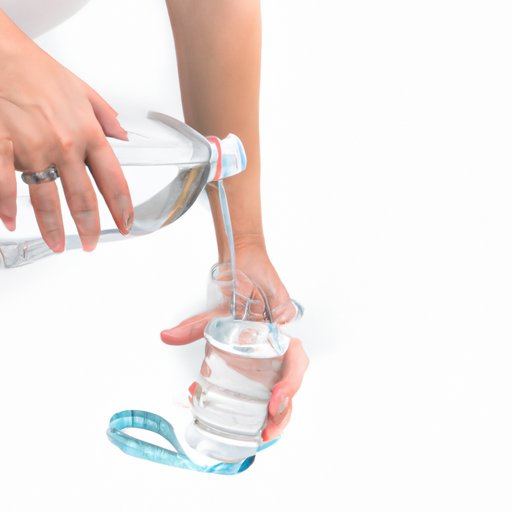
I. Introduction
Water weight is a common phenomenon that many people experience without even realizing it. Also known as fluid retention, water weight can cause considerable discomfort, bloating, and puffiness. Understanding what causes water weight is important for overall health and wellbeing, as it may lead to more severe health conditions if left untreated. In this article, we will cover what water weight is, why it occurs, and what you can do to manage it.
II. What is Water Weight and What Causes it?
Water weight refers to the extra water that is retained in the body’s tissues or circulatory system. This excess water can be a result of various factors, such as hormonal changes, dietary habits, or a sedentary lifestyle. There are also different types of swelling related to water weight, such as peripheral edema and pulmonary edema.
III. Understanding Edema: What Triggers the Extra Water?
Edema is the medical term for swelling caused by the accumulation of fluid. It typically occurs in the feet, ankles, and legs but can occur in other areas of the body as well. There are various types of edema, including peripheral edema, pulmonary edema, and cerebral edema. Medical conditions like heart disease, kidney disease, and liver disease can all lead to edema, as can medications like steroids and nonsteroidal anti-inflammatory drugs (NSAIDs). Additionally, pregnancy and menstruation can also cause edema.
IV. How Your Diet Can Lead to Water Retention & How to Fix It
Diet plays a significant role in water weight gain. Consuming too much salt, for instance, can lead to water retention. High-sodium foods like processed foods, canned foods, and deli meats are notorious for causing water retention. However, reducing sodium intake can alleviate water retention. Eating foods that are high in potassium, such as bananas, avocados, and sweet potatoes, can also help reduce water weight by flushing out excess sodium from the body. Additionally, drinking plenty of water can help prevent dehydration, which can cause the body to retain water.
V. The Role of Hormones in Water Weight Gain
Hormonal imbalances can affect fluid levels in the body and contribute to water weight gain. Hormones like estrogen, cortisol, and aldosterone can all impact water retention. For instance, estrogen levels can increase during menstruation, leading to water retention. Cortisol, the stress hormone, can also cause water retention by increasing salt and water retention in the kidneys. Aldosterone, produced by the adrenal glands, regulates salt and water balance in the body and can lead to water retention if not functioning correctly.
VI. How Alcohol Consumption Can Cause Water Weight & Hangovers
Alcohol consumption can lead to dehydration and, in turn, cause water retention. Regular drinking can cause the body to retain water and contribute to bloating and puffiness. Additionally, alcohol can lead to hangovers, which are often accompanied by headaches, fatigue, and dehydration. Drinking plenty of water and electrolyte-rich fluids can help alleviate these symptoms and reduce water weight.
VII. Sitting All Day: Why Being Sedentary Can Lead to Fluid Retention
A sedentary lifestyle can cause the body to retain water. It’s because a lack of movement can hamper the body’s circulatory system. When you sit or stand in one place for prolonged periods, your veins and blood vessels can become compressed, causing the fluid to accumulate in your legs and feet. Doing activities like stretching and walking can help improve circulation and prevent water retention.
VIII. How to Release Water Weight Through Diet, Exercise, and Lifestyle Changes
There are many ways to manage water weight. For instance, increasing physical activity can reduce water weight by improving circulation and aiding in sweating, which helps release excess salt and water. Similarly, dietary changes, including reducing sodium intake and staying hydrated, can also help alleviate fluid retention. Additionally, managing stress levels and getting adequate sleep can prevent hormonal imbalances that contribute to water weight gain.
IX. Conclusion
Water weight can cause considerable discomfort and affect the quality of life. However, with the right approach, it’s possible to manage fluid retention and improve overall health and wellbeing. By understanding the causes of water weight and making conscious lifestyle and dietary changes, it’s possible to achieve a more comfortable, less bloated, and energized you.




